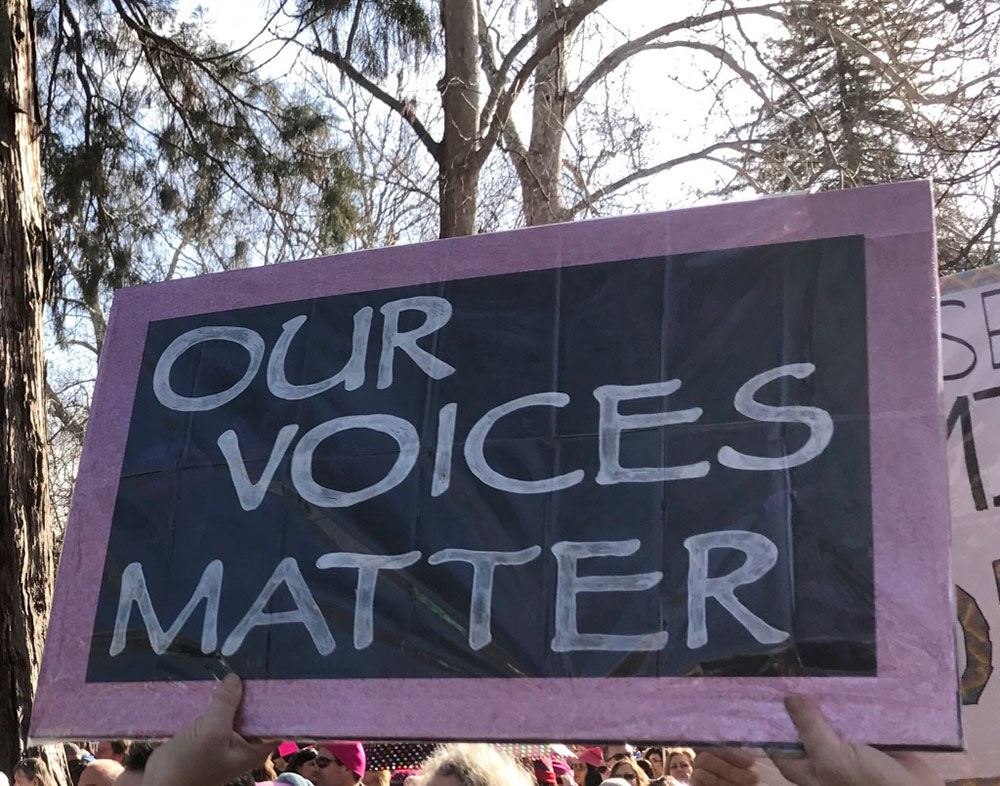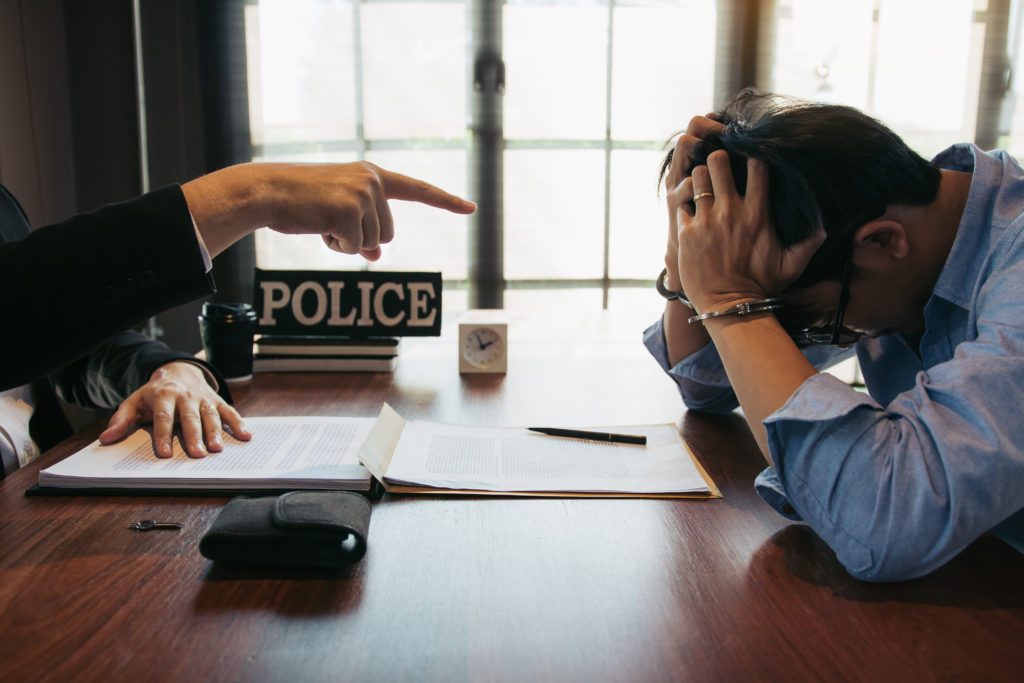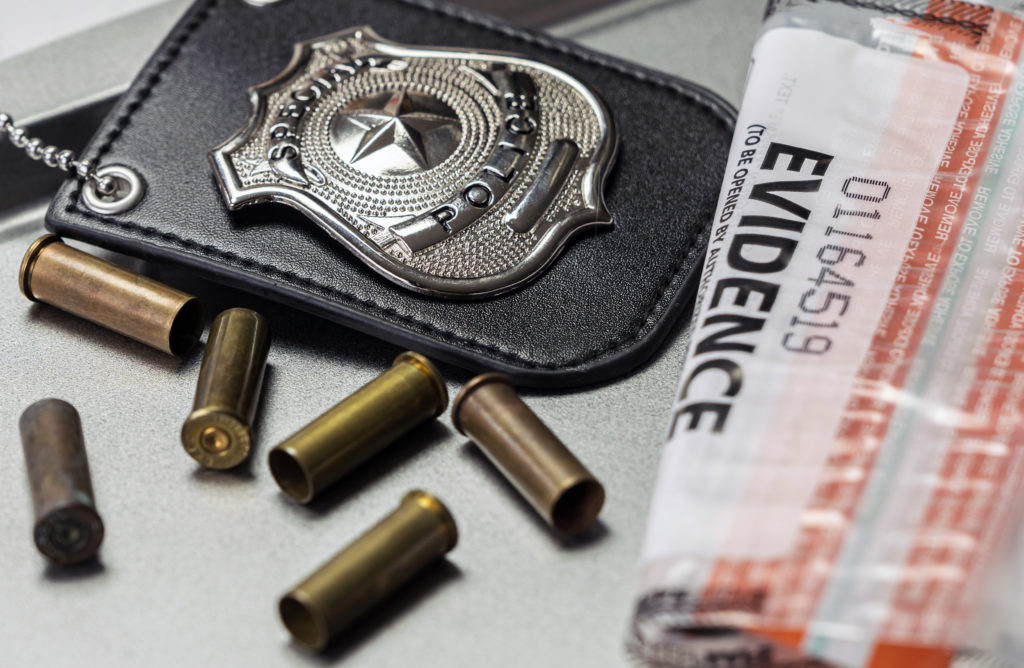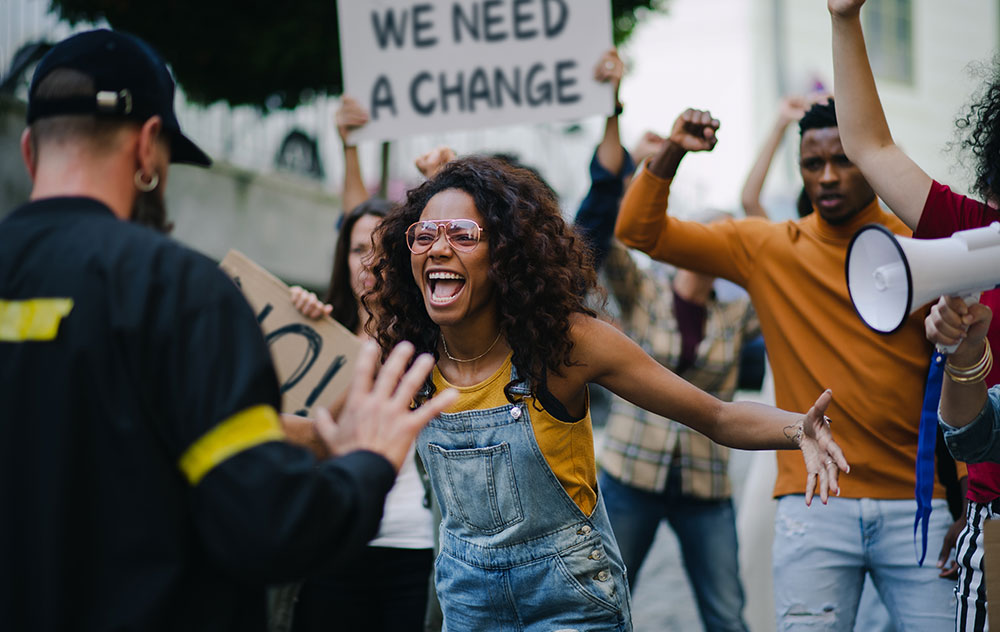May 9, 2025 | Civil Rights Law, Constitutional Rights, First Amendment
Protecting free speech and defending against First Amendment retaliation

The purpose of Colorado’s anti-SLAPP law
In a democratic society, the ability to voice opinions about government actions and the conduct of public officials is fundamental. However, sometimes those in power try to silence criticism through costly and intimidating lawsuits. Colorado’s anti-SLAPP law can shield those speaking out on matters of public concern.
Colorado joined the ranks of states with strong anti-SLAPP protections in 2019 when Governor Jared Polis signed House Bill 19-1324 into law. “SLAPP” stands for Strategic Lawsuit Against Public Participation. These lawsuits are often legal bullying tactics used to silence critics by threatening them with expensive litigation.
The Colorado General Assembly recognized this problem and enacted the anti-SLAPP statute, noting “that it is in the public interest to encourage continued participation in matters of public significance and that this participation should not be chilled through abuse of the judicial process.” They stated that the purpose of the law was “to encourage and safeguard the constitutional rights of persons to petition, speak freely, and otherwise participate in government to the maximum extent permitted by law and, at the same time, to protect the rights of persons to file meritorious lawsuits for demonstrable injury.” (C.R.S. § 13-20-1101)
This balancing act helps maintain both free expression and access to justice. The statute protects individuals’ rights to participate in government and speak on matters of public concern while ensuring that truly injured parties can still seek redress through the courts.
SLAPP suits have been used against journalists, environmental activists, consumer advocates, and everyday citizens, like Colorado parents who speak out on matters of public concern involving their schoolchildren. By providing anti-SLAPP protections, Colorado allows journalists to report without fear of financial consequences to their newsrooms and empowers citizens to participate in democratic discourse without fear or intimidation.
How do anti-SLAPP laws work?
Using the special motion to dismiss: A powerful tool for defendants
Colorado’s anti-SLAPP law provides a powerful tool for people who believe they face meritless lawsuits targeting their protected speech. It establishes an expedited process for courts to follow when a defendant files a motion to dismiss a lawsuit based on the fact that they were exercising their constitutional right of free speech or to petition the government.
Here is how this special motion to dismiss works:
-
Filing the motion: A defendant can file a special motion to dismiss within 63 days after being served with the lawsuit. Extensions may be granted with court permission.
-
Showing protected speech: The defendant must demonstrate that the lawsuit is based on their speech or conduct involving a matter of public concern. The law specifically protects statements made before legislative, executive, or judicial proceedings; statements made in connection with issues under consideration by governmental bodies; statements made in public forums about matters of public interest; and other forms of protected speech.
-
Automatic stay of discovery: When a defendant files this special motion, the court issues an automatic stay of discovery, pausing the expensive discovery process until the motion is resolved. This is a crucial protection that prevents plaintiffs from using the discovery process to harass defendants or rapidly drive up litigation costs.
-
Shifting the burden: Once the defendant demonstrates that the case involves protected speech, the burden shifts to the plaintiff to establish “a reasonable likelihood” of prevailing on the claim. This higher standard at an early stage of litigation provides significant protection for defendants.
-
Expedited hearing: The court should hold a hearing on the special motion to dismiss no later than 28 days after it is filed unless the court must schedule it for a later date. This ensures a speedy resolution rather than allowing a SLAPP suit to drag on indefinitely.
-
Attorney fees and costs: If the defendant prevails on the special motion to dismiss, they are entitled to recover attorney fees and costs from the plaintiff. This financial consequence serves as a deterrent against filing frivolous lawsuits intended only to silence protected speech. But if the court finds that a defendant’s special motion was frivolous or solely intended to cause unnecessary delay, it will award attorney fees and costs to the plaintiff instead.
-
Immediate appeal: The order granting or denying the special motion is immediately appealable to the Colorado Court of Appeals. This provides an additional layer of protection for both parties’ rights. (C.R.S. § 13-20-1101.)
The Colorado anti-SLAPP statute has been applied in various contexts, including a recent case before the Colorado Supreme Court examining the “public interest” parameters of the law regarding online reviews of a veterinary clinic. (Tender Care Veterinary Ctr. v. Lind-Barnett)
First Amendment retaliation claims after successful anti-SLAPP motions
An interesting legal scenario arises when a government employee sues a citizen for statements made about that employee’s official actions, and the citizen successfully defends using an anti-SLAPP motion. In such cases, the citizen might have grounds for a First Amendment retaliation claim against the government employee.
While there isn’t a Colorado precedent directly on point, the U.S. Court of Appeals for the Tenth Circuit (which includes Colorado) has provided guidance in cases involving government retaliation for protected speech. In Beedle v. Wilson, the court considered a case where a governmental entity (a public hospital) filed a defamation lawsuit against a private citizen who had criticized it.
The Tenth Circuit recognized that when a governmental entity brings a lawsuit against a citizen for criticizing government actions, First Amendment concerns are implicated. The court determined that such a lawsuit could potentially constitute retaliation that violates the First Amendment and provides grounds for a civil rights claim under law. (42 U.S.C. § 1983)
How First Amendment retaliation claims work using Colorado’s anti-SLAPP law:
-
Protected speech: The defendant’s statements about the government employee’s political or governmental actions would need to constitute protected speech under the First Amendment, which generally protects speech on matters of public concern. The Supreme Court has long held that speech on matters of public concern deserves heightened First Amendment protection, such as in N.Y. Times Co. v. Sullivan, where the court noted the “profound national commitment to the principle that debate on public issues should be uninhibited, robust, and wide-open.”
-
Adverse action: The government employee’s act of filing a lawsuit against the defendant can be considered an adverse action likely to deter a person from continuing to engage in protected speech. In Beedle, the Tenth Circuit recognized that being subjected to litigation could constitute such an adverse action.
-
Causal connection: The crucial element is demonstrating a causal connection between the defendant’s protected speech and the government employee’s retaliatory action (filing the lawsuit). A successful anti-SLAPP motion can provide evidence of this causal link, as it establishes that the lawsuit targeted protected speech.
-
Improper motive: To succeed on a First Amendment retaliation claim, the defendant must show that the government employee’s primary motive in filing the lawsuit was to retaliate against the defendant for their protected speech, rather than to genuinely seek legal redress for a legitimate harm.
In Colorado, this means that if a government employee sues a citizen for statements about the employee’s political or governmental actions, and the citizen successfully defends using Colorado’s anti-SLAPP law, the citizen may have grounds for a federal civil rights lawsuit.
Such a claim would allege that the government employee’s lawsuit constituted illegal retaliation for the exercise of First Amendment rights. If successful, the citizen could recover damages, attorney fees, and costs beyond what the anti-SLAPP statute itself provides. The Civil Rights Attorney’s Fees Awards Act authorizes courts to award reasonable attorney fees to prevailing parties in civil rights litigation.
It’s worth noting that these retaliation claims face certain legal hurdles. The citizen must prove that the government employee acted under “color of law” rather than in a purely private capacity. As the Supreme Court has held, the under-color-of-state-law element of the code excludes from its reach “merely private conduct, no matter how discriminatory or wrongful.” (Blum v. Yaretsky)
Additionally, various immunity doctrines may protect government officials in certain circumstances. Government officials performing discretionary functions are entitled to qualified immunity unless their conduct violates “clearly established statutory or constitutional rights of which a reasonable person would have known.” (Harlow v. Fitzgerald)
 Has your free speech been threatened?
Has your free speech been threatened?
When government employees misuse the legal system to silence criticism of their official actions, the combination of anti-SLAPP protections and potential First Amendment retaliation claims gives citizens powerful legal recourse. They ensure that individuals can speak truth to power without fear of retaliatory litigation designed to silence their voices.
However, while these anti-SLAPP laws shield citizens from legal intimidation tactics, you need an experienced civil rights attorney to help you fight these lawsuits. The Civil Rights Litigation Group understands the expedited process to dismiss meritless lawsuits targeting free speech and the First Amendment retaliation claims that may follow. We believe the law should protect rather than punish those who exercise their constitutional right to comment on matters of public concern. If your free speech rights have been violated, contact us today to see how Colorado’s anti-SLAPP law can protect you.
Call the Civil Rights Litigation Group at 720-515-6165.
Mar 17, 2024 | Civil Rights Law, Constitutional Rights
The First Amendment of the Constitution states that “Congress shall make no law respecting an establishment of religion, or prohibiting the free exercise thereof; or abridging the freedom of speech, or of the press; or the right of the people to peacefully to assemble, and to petition the Government for a redress of grievances.” However, free speech isn’t an all-inclusive principle, meaning that there are some instances of speech and expression that the First Amendment doesn’t protect. What is protected speech?

Free speech and protected speech
One reason for continually examining free speech is that the Constitution is vague. The Supreme Court further defined free speech: “If there is a bedrock principle underlying the First Amendment, it is that the government may not prohibit the expression of an idea simply because society finds the idea itself offensive or disagreeable” (Texas v. Johnson). This language restricts the government’s ability to constrain speech, but, the limitations of speech and expression often depend on context, such as a corporate office or a school.
Free speech laws are extremely complex, and it’s critical to remember that free speech doesn’t protect things like defamation and libel, threats, false advertising, and more.
Differences between protected speech and unprotected speech
There are many exceptions to free speech that the Supreme Court has supported for some time. For example, the Court has decided that the First Amendment provides no protections for things like obscenity, child pornography, or speech that constitutes true threats or “fighting words,” which may produce a clear and present danger. The Court provides less than full protections for many other types of speech, including:
- Commercial speech
- Defamation, libel, and slander
- Speech that might be harmful to children
- Speech broadcasts on television and radio
- Public employees’ speech
At the same time, the Supreme Court, as well as many government and nonprofit agencies, have contributed to the definition of protected speech as well. As a broad rule, virtually all other types of speech are protected, but the government may be able to regulate speech in certain circumstances. The government may attempt to regulate an act of free speech (including verbal communication as well as visual, art, music, theater, dance, literature, and more) through prior restraint. Additionally, acts that normally have the fullest First Amendment protections may still be restricted due to “regulations of the time, place, and manner of expression which are content-neutral, are narrowly tailored to serve a significant government interest, and leave open ample alternative channels of communication.”
What to do if your free speech rights were violated
To better understand what constitutes protected speech and unprotected speech (and therefore, your rights in Colorado regarding free speech), here are a few examples:
-
Subversive advocacy — Individuals can express lawlessness, but there is a limit to this protection. For subversive advocacy (expression promoting lawlessness) to fall outside of First Amendment protections, it needs to be directed at producing imminent lawless action and the speech needs to be likely to produce lawless action.
-
Fighting words — Similar to the above example, speech cannot incite clear and present danger or violence. However, fighting words often need to be insults personally directed at a person and not political statements that the person would find offensive. Provocative political speech is often fully protected, but not clear and directed insults designed to start a fight or a threat.
-
True threats — True threats are defined as “statements where the speaker means to communicate a serious expression of an intent to commit an act of unlawful violence to a particular individual or group of individuals.” As such, the speaker may not need to carry out the threat, but only to intently produce fear of bodily harm or death in the victim.
-
Obscenity — Material, speech, and/or expression must meet the following three standards to be considered obscene and not protected by First Amendment laws. These three standards include:
- Whether “the average person, applying contemporary community standards”, would find that the work, taken as a whole, appeals to the prurient interest
- Whether the work depicts or describes, in a patently offensive way, sexual conduct or excretory functions specifically defined by applicable state law
- Whether the work, taken as a whole, lacks serious literary, artistic, political, or scientific value.
-
Child pornography. Plainly put, child pornography is an unprotected category of expression.
-
Commercial expression that concerns illegal activity, or commercial expression that is false or misleading — Commercial speech is only protected if it contains legal activity and it’s content is true and not misleading.
Contact the Civil Rights Litigation Group in Denver
The Civil Rights Litigation Group deals with issues regarding free speech. First Amendment and protected speech legal cases can be extremely complex, but at the same time, it is clear when someone is making true threats, producing obscene material, or producing false advertising and misleading information. Fortunately, if your right to free speech is being regulated or restricted in any way — or you’re facing adverse repercussions for your speech, and your speech doesn’t fall under the umbrella of “unprotected speech”— then call the Civil Rights Litigation Group in Denver, CO. We offer free, no-obligation consultations.
Call our law offices today at 720-515-6165.
May 25, 2023 | Civil Rights Law, Criminal Defense
 If you live in Colorado, getting your records sealed is much easier than it used to be. Landmark legislation (House Bill 19-1275) made it possible to seal many convictions and other types of criminal justice records that were never eligible for sealing in the past. You can even move to seal multiple convictions in some cases, and the rules allow for the sealing of many types of felonies, not just lower-level offenses. The new law even allows you to get records sealed for some types of sex offenses.
If you live in Colorado, getting your records sealed is much easier than it used to be. Landmark legislation (House Bill 19-1275) made it possible to seal many convictions and other types of criminal justice records that were never eligible for sealing in the past. You can even move to seal multiple convictions in some cases, and the rules allow for the sealing of many types of felonies, not just lower-level offenses. The new law even allows you to get records sealed for some types of sex offenses.
Who is eligible to have their records sealed?
If you have a case that resulted in a complete dismissal, acquittal, or you successfully completed a deferred judgment, then you may be eligible to have your records sealed automatically. This simplified process requires the court to seal your records and is very streamlined. In most of these cases, the prosecution cannot even object. It is your right to have your records sealed.
When can I have conviction records sealed?
The law also allows for the sealing of convictions for many types of offenses. For eligible types of convictions, if you have not been charged with any new crimes after the case you are trying to seal, you can move to have your records sealed after the passage of short waiting periods. Those waiting periods end after your conviction is final or your sentence is complete, whichever happens last. The waiting periods are:
- Petty offenses: 1 year
- Class 2 or 3 misdemeanors: 2 years
- Class 1 misdemeanors: 3 years
- Level 3 or 4 drug felony: 3 years
- Class 4, 5, or 6 felony: 3 years
- All others: 5 years
In addition to having a clean record after the conviction you want sealed, you also must ensure you’ve paid all your fines, costs, and restitution to be eligible. In general, to have conviction records sealed, “the court must determine that the harm to the privacy of the defendant or the dangers of unwarranted, adverse consequences to the defendant outweigh the public interest in retaining public access to the conviction records. In making this determination, the court shall, at a minimum, consider the severity of the offense that is the basis of the conviction records sought to be sealed, the criminal history of the defendant, the number of convictions and dates of the convictions for which the defendant is seeking to have the records sealed, and the need for the government agency to retain the records.” C.R.S. §24-72-706(1)(g). 
What are the exceptions?
There are certain convictions that you cannot seal, but careful analysis of each case is necessary to determine eligibility. There is, however, an exception for certain misdemeanors that are normally prohibited from sealing “if the district attorney consents to the sealing or if the court finds, by clear and convincing evidence, that the petitioner’s need for sealing of the record is significant and substantial, the passage of time is such that the petitioner is no longer a threat to public safety, and the public disclosure of the record is no longer necessary to protect or inform the public.” C.R.S. §24-72-706(2)(b).
How can we help get your records sealed?
We help people seal their records in all types of cases, which can make a huge difference the next time a standard background check needs to be conducted, whether for work, housing, financing, or any other purpose. You can also move to seal certain municipal convictions as well. Call us today for a free consultation to determine your eligibility to get your records sealed, and to help us formulate the best strategy for putting your past where it belongs—behind you.
Call 720-515-6165 for a free consultation.
Nov 21, 2022 | Civil Rights Law, Police Misconduct

When people are brought in for questioning by the police, they are expected to tell the truth or get in trouble. But what about the officers questioning you — are they bound to be truthful? In Colorado and most states, the short answer is no. They can’t lie in every instance, and they can’t fabricate evidence (Florida v. Cayward, 1989), but most of the time it’s completely legal for them to lie so it’s important to remember this if you are ever interrogated. The Supreme Court ruled in Frazier v. Cupo (1969) that police officers can lie during an investigation as long as it does not “shock the conscience of the court or the community.” For instance, they can’t tell someone that they will lose custody of their children if they don’t confess (Lynumn v. Illinois, 372 US 528 (1963). But they most certainly can lie about a lot of things that can intimidate people into confessing to crimes they didn’t commit. And as long as the court determines that a confession was voluntary and not obtained through violence, the court could allow it.
So, what do the police lie about?

When interrogating someone, the police can use every psychological trick they have to elicit a confession. They can lie about evidence they have, such as telling you that they found your fingerprints at the scene or that you were caught on camera. They might tell you that other people involved have already confessed and have implicated you as well. They might say they have already spoken to your spouse or friend who believe you are guilty. If you take a polygraph test, they can lie and tell you that you didn’t pass. The important thing to remember in these cases is that they can lie about evidence, but they can’t fabricate it. So, if they tell you they have your fingerprints on something, ask to see it. If they tell you they have video of you at a crime scene, ask to see it. And if they show you evidence that you know isn’t real, they have definitely crossed a line. Another thing they cannot do is lie to you about your rights or tell you that incriminating statements you might give won’t be used against you. Miranda warnings (from Miranda v. Arizona, 1966) are required before police officers can legally interrogate you while you are in custody. Those warnings make clear that you have the right to remain silent and that anything you say can and will be used against you in a court of law. Thus, the best practice is almost always to exercise that right and remain silent.
There are a lot of ways the police can trick people into confessing to crimes, even ones they didn’t commit. And you may think that no one would ever admit to doing something they didn’t do, but the psychological pressure of an interrogation can certainly cause someone to do so. Because of this, it’s important to always remember that you have the right to be silent and the right to have an attorney present for questioning. Police might also tell you that you will get a lighter sentence if you confess now instead of waiting for an attorney, but cops don’t decide sentencing so always ask for and consult with a lawyer before believing anything police say.
It’s also important to remember than the police don’t have to read you your Miranda rights unless they take you into custody. So, if you are speaking with an officer at the scene of a crime and they suspect you may be involved, they can intentionally tell you that you are not under arrest in order to get you talking while not technically in custody or they could lie to you about any number of things in order to get you to keep talking before they place you in custody. And if you do so willingly, your statements can be used against you in court. So always keep your guard up if you are speaking to police and there is any chance at all they think you did something wrong. Obviously, you should help the police if you call them about a crime, and often it may be in the public’s interest to serve as a witness to a crime if you have valuable information, but always remember that being innocent isn’t a guarantee that you won’t be implicated in something.
Youth are even more vulnerable when the police lie
The worst part about all this is that in most states the police can lie to kids. Some states, including Colorado (https://leg.colorado.gov/bills/sb22-023), are currently trying to pass laws to stop this. The bill didn’t pass in Colorado this year but legislators are going to reintroduce it in the 2023 session. Kids are even more vulnerable to being intimidated by the police because they either fear or trust them — and the police will absolutely use this to their advantage. Juveniles are also much less likely to know their actual rights when being questioned so it’s easy for an officer to scare them into confessing to something they didn’t do. Our brains don’t fully develop until we are in our mid-twenties, so children and even teens don’t have the same decision-making or reasoning skills that are needed during an interrogation. But until the laws do change, officers are still able to lie to them so it’s important to teach kids what their rights are and how to deal with the police. We recommend readying your children as much as readying yourself for potential police interactions. Make sure they understand that if your children are stopped, they may request a parent, guardian, and/or lawyer be present for questioning, and obviously, they have the right to remain silent.
What are your rights during an interrogation?
The Fifth Amendment protects you from being forced to incriminate yourself and the Fourteenth Amendment prohibits coercive questioning by the police. So, if a confession is coerced or involuntary, it isn’t admissible in court. Also, if the police are going to take you into custody, they should inform you of your Miranda rights — but they don’t always do that. For a confession to be considered involuntary or coerced, usually, one or more of the following needs to have happened:
- The police deprived you of food, water or using the bathroom
- You were denied legal counsel
- The police promised you leniency or told you that your statements wouldn’t be used against you
- The police threatened you in some material way (other than threats to carry out the law)
- They physically harmed you or used a gun to intimidate you into confessing.
The court will also consider other factors such your age, the location and/or length of the interrogation, your mental health at the time, level of intelligence, or if your thinking was impaired due to intoxication. The main legal standard for proving an involuntary confession is whether the police used tactics that undermined your ability to exercise free will.
What can you do?
The most important thing you can do is be aware of your rights and choose to remain silent until you have legal counsel present when you are questioned by the police. They can’t use that against you, although many will lie and tell you that things will be better if you just talk to them — but don’t believe it. And if you were accused of a crime you didn’t commit and believe the police fabricated evidence against you, it’s important that you contact an attorney who specializes in civil rights and dealing with the police. Call us for a free consultation.
Call 720-515-6165 for a free consultation.
Jul 25, 2022 | Civil Rights Law, Police Misconduct
 Anyone who’s watched a cop show has likely heard of Miranda rights. At some point during an arrest, you’ll hear the officer say, “You have the right to remain silent. Anything you say can and will be used against you in a court of law. You have a right to an attorney. If you cannot afford an attorney, one will be appointed for you.” The wording might vary slightly from state to state, but the message is the same: the police can’t force you to answer their questions. You have the right to remain silent to avoid incriminating yourself, something every lawyer constantly reminds their clients to do.
Anyone who’s watched a cop show has likely heard of Miranda rights. At some point during an arrest, you’ll hear the officer say, “You have the right to remain silent. Anything you say can and will be used against you in a court of law. You have a right to an attorney. If you cannot afford an attorney, one will be appointed for you.” The wording might vary slightly from state to state, but the message is the same: the police can’t force you to answer their questions. You have the right to remain silent to avoid incriminating yourself, something every lawyer constantly reminds their clients to do.
Miranda Rights became law in 1966 as a result of the United States Supreme Court (SCOTUS) case of Miranda v. Arizona. The Miranda warning — that officers are supposed to read to anyone being arrested — is intended to protect your Fifth Amendment right to refuse answering self-incriminating questions. Now, it’s important to remember that Miranda rights only take effect after you are placed under arrest. Before that, the officers can ask you anything. Officers should, but aren’t compelled to let you know that answering their questions outside an arrest is voluntary. That is why attorneys always advise the best answer is simply, “My lawyer has advised me not to answer any questions without them present.” This is especially important if you think there is any chance at all that the police suspect you of committing a crime. Even when you aren’t – are you confident that you know all of the laws and that you have not violated any law? Keep in mind Congress passes a new book of laws every single year. With that happening, even a lawyer might have trouble keeping up with every new law that is passed. Can you ever really be sure you have not violated a law? Can anyone?
What if an officer doesn’t read you your Miranda rights?
If you aren’t read your Miranda rights before officers question you while you are in custody (something called a custodial interrogation), then the state should not be permitted to legally use what you say afterward against you at trial. Statements made in response to police interrogation without a suspect being mirandized is commonly referred to as fruit of the poisonous tree. Recognizing that type of evidence is inadmissible at trial is supposed to be the main catalyst for ensuring cops read that warning at an appropriate time because otherwise they risk losing the case and letting a supposed criminal go free — what’s the point of getting a confession from someone if it becomes inadmissible at trial?
However, just because they are required to inform you of your Miranda rights doesn’t mean they always do. The police are very skilled at trying to get information out of people and not all of them play by the book. If they believe you are guilty of something or know something, they will use every trick they know to get that information out of you, including psychological and sometimes even physical tactics. And sometimes, they don’t read you the Miranda warning. If that happens to you, you should absolutely get a good criminal defense lawyer and challenge the admissibility of the evidence.
The new SCOTUS ruling on Miranda rights
On June 23, 2022, the Supreme Court ruled in Vega v. Tekoh that if an officer doesn’t read you your Miranda rights, you cannot sue them for money damages. Basically, this means that you have no civil recourse against them if you end up having to stand trial because you were detained or prosecuted based on something you said without knowing your rights. So, even if you end up spending time in jail, losing your job, losing your reputation, and who knows what else based on ill-gotten evidence, you can no longer file a civil suit to recoup damages based on a Miranda violation. The cops may have violated your rights, but your only avenue for relief is to get the evidence suppressed in your criminal case.
That is important because before this, some jurisdictions allowed people to sue officers for violating this important civil right. Section 1983 of U.S. Code broadly authorizes civil rights lawsuits against state and local officials responsible for the “deprivation of any rights … secured by the Constitution.” Without that protection, there’s very little chance officers will face any punishment for not issuing Miranda warnings to suspects before interrogation because history has shown that police departments rarely punish their own. In fact, Supreme Court Justice Elena Kagan warned in a dissent that the Supreme Court has effectively created a new legal immunity for cops accused of violating a suspect’s Fifth Amendment rights.
Now, this ruling doesn’t mean that the evidence the cops get after speaking to you without reading your rights can be used in court, but that only comes into play if you actually know about those rights to begin with. And that is what has civil rights attorneys worried. If an officer believes a suspect doesn’t know about or understand Miranda rights, then what’s to stop them from not reading them to a suspect at all? Quite often, younger suspects or those with mental challenges may not understand their rights and will end up incriminating themselves without knowing they had another option.
And this is why, as The Clash has sung, it’s always important to know your rights.
What can I do to if the police violated my rights?
Just because you can no longer sue the police for not reading you your Miranda rights doesn’t mean you can’t sue them for other civil rights violations. If you believe you are the victim of police misconduct, such as unlawful arrest, wrongful prosecution, or excessive force it’s important that you contact a civil rights attorney as soon as possible because there are time limits to filing those claims (typically two years from the date of the incident). The Civil Rights Litigation Group has prevailed in many cases against the police in Colorado for violating people’s rights. Give us a call for a free consultation – 720-515-6165.
Call us at 720-515-6165.
Related blog posts:
Fighting back against malicious prosecution
Record the police and protect your rights
Know your rights when questioned by the police
Police misconduct and your civil rights
Wrongful arrest? Here’s what you need to prove
Oct 13, 2021 | Civil Rights Law, Constitutional Rights, Discrimination
 We often hear people talk about civil liberties and civil rights and how they are being violated, but do you actually know what they really are and what they afford you as an American? Simply put, they are the personal rights that are guaranteed by the U.S. Constitution and other federal laws enacted by Congress. They are designed to recognize the free-decision making required for individual autonomy and provide all Americans equal social opportunities and equal protection under the law regardless of race, religion, gender, age, or other personal characteristics. Aside from the rights and liberties expressly spelled out in the Bill of Rights, they include things like the Civil Rights Act of 1871, the Civil Rights Act of 1964, and the Americans with Disabilities Act of 1990.
We often hear people talk about civil liberties and civil rights and how they are being violated, but do you actually know what they really are and what they afford you as an American? Simply put, they are the personal rights that are guaranteed by the U.S. Constitution and other federal laws enacted by Congress. They are designed to recognize the free-decision making required for individual autonomy and provide all Americans equal social opportunities and equal protection under the law regardless of race, religion, gender, age, or other personal characteristics. Aside from the rights and liberties expressly spelled out in the Bill of Rights, they include things like the Civil Rights Act of 1871, the Civil Rights Act of 1964, and the Americans with Disabilities Act of 1990.
In the U.S., federal and state law has been enacted to prohibit discrimination based on protected-class characteristics (such as race, color, religion, creed, national origin, ancestry, gender, sexual orientation, pregnancy, age, disability, etc.) when it comes to things like education, employment, access to public assistance and facilities, housing, or healthcare, just to name a few. The great thing about our Constitution and our system of laws is that it’s possible to make changes over time to correct or add things the original framers didn’t necessarily take account of or which were against social norms in the 1700s. One big example is slavery, which was still legal in 1776 and widely practiced in the South. That civil rights change only came about because of the Civil War and even then people have had to continue to fight so that people of color would eventually be given the same rights and the same treatment as others. Other civil liberties and civil rights have been secured either by new legislation or court cases providing precedence. But all of these require continued vigilance and enforcement through litigation.
What’s the difference between civil liberties and civil rights?
 While the term “civil rights” generally refers to a broad scope of civil liberties and civil rights that persons in this country possess by virtue of restraint on our government, technically speaking, there are differences. Civil liberties specifically refer to basic freedoms enshrined in the Bill of Rights that create a space of freedom in which government actors are not supposed to encroach upon, while civil rights include not only space within which governmental actors should not encroach, but also affirmative laws that impose practical requirements to protect from discrimination. Many of your civil liberties are guaranteed by placing limits on what the government can do to you, such as limit your freedom of speech or imprison you without proper cause. Other civil liberties include the right to privacy, the right to remain silent, the right to a fair trial, and the right to vote, something that both women and people of color had to fight for as they were not similarly recognized in the original Constitution. Most recently, the LGBTQ community fought to guarantee the right to marry for same-sex couples, a civil liberty the original framers would likely not have ever formally considered.
While the term “civil rights” generally refers to a broad scope of civil liberties and civil rights that persons in this country possess by virtue of restraint on our government, technically speaking, there are differences. Civil liberties specifically refer to basic freedoms enshrined in the Bill of Rights that create a space of freedom in which government actors are not supposed to encroach upon, while civil rights include not only space within which governmental actors should not encroach, but also affirmative laws that impose practical requirements to protect from discrimination. Many of your civil liberties are guaranteed by placing limits on what the government can do to you, such as limit your freedom of speech or imprison you without proper cause. Other civil liberties include the right to privacy, the right to remain silent, the right to a fair trial, and the right to vote, something that both women and people of color had to fight for as they were not similarly recognized in the original Constitution. Most recently, the LGBTQ community fought to guarantee the right to marry for same-sex couples, a civil liberty the original framers would likely not have ever formally considered.
Affirmative civil rights laws beyond those contained in the Constitution, such as Title VII, are designed to protect people from discrimination in not only the public sphere, but also the private sphere. For example, an employer (whether government or private corporation) can’t lawfully choose to promote only the men in the company, or layoff people just because they are over 50. Women can no longer be fired or denied promotions for getting pregnant; in fact, employers must accommodate pregnant women in the workplace. Your doctor can’t deny you medical care because they don’t like people of your race. And schools must provide a free education to all children in the U.S. and can’t segregate them into different schools. This is an example of a right that was won by a court case in 1954, Brown v. Board of Education.
Fighting for your rights
Fighting for our civil rights, broadly, is something we all must continue to do because our system of governance requires vigilant recognition of the boundaries of our common rights and increasing recognition of rights needed to address marginalized people in our society, methods of ensuring fair and equal treatment under the law, and enforcement through lawsuits, because, unfortunately, not everyone follows the law. Much of the civil rights fight happens in the political world, through voting, protests, and other methods of speaking out. The death of George Floyd in May 2020 brought about huge civil rights protests in many U.S. cities. Those protests brought about change and many states have passed new laws, such as requiring the police to wear cameras to accurately record what they do. As lawyers, we support, but cannot directly assist with political efforts. But when it comes to enforcement of the law, we have the tools necessary to sue, for example, employers that continue to find ways to discriminate and government agencies like police departments that continue to violate people’s civil constitutional rights on a daily basis. We are 100% dedicated to using the law to enforce your civil liberties and rights from those who would seek to violate them. We broadly refer to these collection as civil rights.
We can fight for your civil liberties and civil rights
If you feel that your civil liberties or civil rights have been violated, we may be able to help. Whether your rights were violated by means of discrimination, police misconduct, or any other manner, it’s important for you to contact an attorney that specializes in civil rights as soon as possible. Many claims have a statute of limitations or other procedural deadlines that waive your right to sue if you wait too long, so time is of the essence. The Civil Rights Litigation Group has handled many civil rights and civil liberties cases and we offer free consultations so you can find out if you have a legitimate case and/or if the attorneys here may be a good match to represent you in your case.
Call the Civil Rights Litigation Group at (720) 515-6165 or use our online contact form to schedule your free consultation with us today.
Call (720) 515-6165

 Has your free speech been threatened?
Has your free speech been threatened?


 If you live in Colorado, getting your records sealed is much easier than it used to be. Landmark legislation (
If you live in Colorado, getting your records sealed is much easier than it used to be. Landmark legislation (


 Anyone who’s watched a cop show has likely heard of
Anyone who’s watched a cop show has likely heard of  We often hear people talk about civil liberties and civil rights and how they are being violated, but do you actually know what they really are and what they afford you as an American? Simply put, they are the personal rights that are guaranteed by the U.S. Constitution and other federal laws enacted by Congress. They are designed to recognize the free-decision making required for individual autonomy and provide all Americans equal social opportunities and equal protection under the law regardless of race, religion, gender, age, or other personal characteristics. Aside from the rights and liberties expressly spelled out in the
We often hear people talk about civil liberties and civil rights and how they are being violated, but do you actually know what they really are and what they afford you as an American? Simply put, they are the personal rights that are guaranteed by the U.S. Constitution and other federal laws enacted by Congress. They are designed to recognize the free-decision making required for individual autonomy and provide all Americans equal social opportunities and equal protection under the law regardless of race, religion, gender, age, or other personal characteristics. Aside from the rights and liberties expressly spelled out in the  While the term “civil rights” generally refers to a broad scope of civil liberties and civil rights that persons in this country possess by virtue of restraint on our government, technically speaking, there are differences. Civil liberties specifically refer to basic freedoms enshrined in the Bill of Rights that create a space of freedom in which government actors are not supposed to encroach upon, while civil rights include not only space within which governmental actors should not encroach, but also affirmative laws that impose practical requirements to protect from discrimination. Many of your civil liberties are guaranteed by placing limits on what the government can do to you, such as limit your freedom of speech or imprison you without proper cause. Other civil liberties include the right to privacy, the right to remain silent, the right to a fair trial, and the right to vote, something that both women and people of color had to fight for as they were not similarly recognized in the original Constitution. Most recently, the LGBTQ community fought to guarantee the right to marry for same-sex couples, a civil liberty the original framers would likely not have ever formally considered.
While the term “civil rights” generally refers to a broad scope of civil liberties and civil rights that persons in this country possess by virtue of restraint on our government, technically speaking, there are differences. Civil liberties specifically refer to basic freedoms enshrined in the Bill of Rights that create a space of freedom in which government actors are not supposed to encroach upon, while civil rights include not only space within which governmental actors should not encroach, but also affirmative laws that impose practical requirements to protect from discrimination. Many of your civil liberties are guaranteed by placing limits on what the government can do to you, such as limit your freedom of speech or imprison you without proper cause. Other civil liberties include the right to privacy, the right to remain silent, the right to a fair trial, and the right to vote, something that both women and people of color had to fight for as they were not similarly recognized in the original Constitution. Most recently, the LGBTQ community fought to guarantee the right to marry for same-sex couples, a civil liberty the original framers would likely not have ever formally considered.